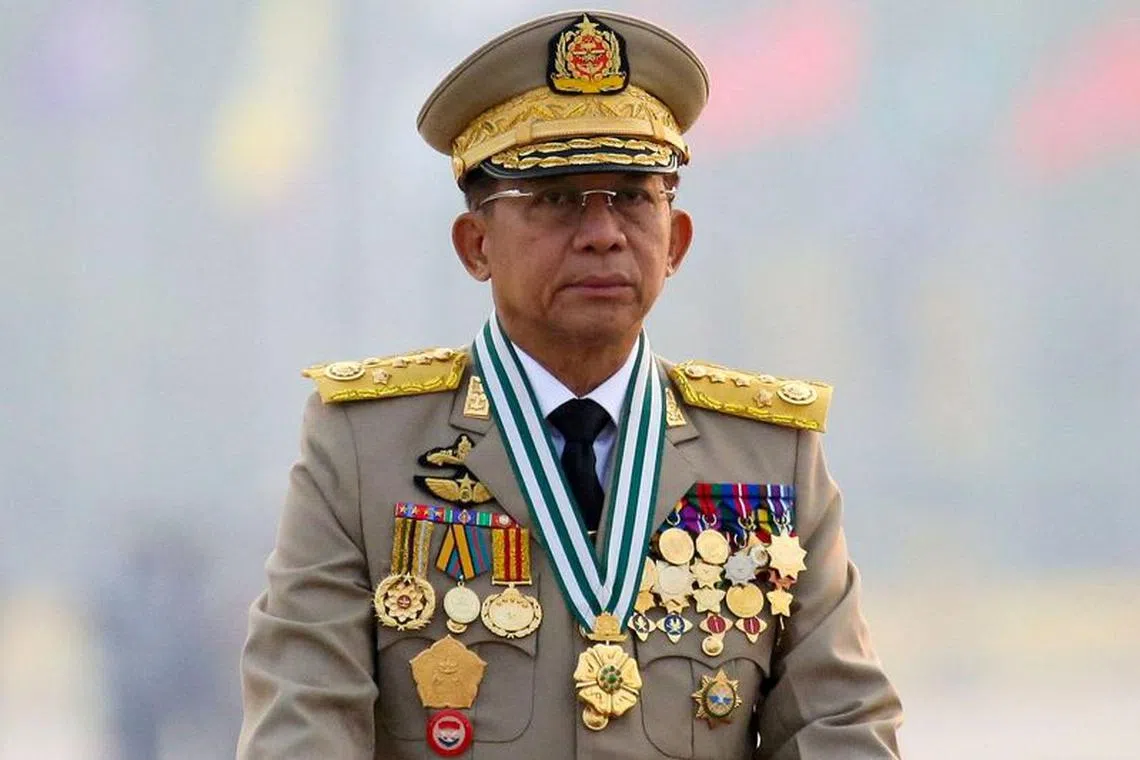Three years after coup, Myanmar junta chief Min Aung Hlaing faces unprecedented pressure
Sign up now: Get insights on Asia's fast-moving developments

Public utterances against Gen Min Aung Hlaing would have been unthinkable just a few months ago.
PHOTO: REUTERS
In mid-January, at a small gathering in a cantonment town in Myanmar, hard-line pro-military monk Pauk Kotaw suggested that the country’s junta chief Min Aung Hlaing step down and his deputy take over. The crowd cheered in agreement, according to videos of the event posted on social media.
Online, pro-military journalists and bloggers have been similarly direct.
“He should resign as commander-in-chief,” Mr Ko Maung Maung, a pro-military YouTuber said in a post.
Such public utterances against Myanmar’s powerful junta leader and the chief of its armed forces would have been unthinkable just a few months ago.
But after seizing power in a dawn coup d'etat on Feb 1, 2021,
Questions about the 67-year-old’s leadership are being asked after a series of battlefield defeats for the military in a sweeping offensive by rebel groups that started in October, dubbed Operation 1027.
So far, the junta has lost control of at least 35 towns, according to the media collective Myanmar Peace Monitor, although a Beijing-mediated ceasefire has halted clashes near the Chinese border. In other parts, fighting continues.
The junta, which has not addressed specifics about battlefield defeats, has previously acknowledged some loss of control of territory.
“There is deep frustration within the military, which extends to Min Aung Hlaing personally,” a diplomat in South-east Asia told Reuters, asking not to be named. “Some would certainly love to see him go.”
The military is also struggling to recruit soldiers and forcing non-combat personnel to the front line – all causing blowback for Gen Min Aung Hlaing, the diplomat said.
A junta spokesman did not respond to calls from Reuters seeking comment.
To be sure, the army’s losses on the battlefield may not lead to a collapse and it is unclear if or how Gen Min Aung Hlaing could be pushed out or who may replace him, including his current deputy Soe Win.
However, the events have damaged both Gen Min Aung Hlaing’s standing and that of the Myanmar military, known as the Tatmadaw, which the United Nations has accused of conducting systematic human rights violations in the country.
“Its poor showing on the battlefield is seen as shameful by nationalists and other military supporters who have launched unprecedented public criticism of Commander-in-Chief Min Aung Hlaing’s leadership,” said Mr Richard Horsey, the Crisis Group’s senior Myanmar adviser.
Those asking hard questions of the regime and its leader include pro-junta journalists, according to a Reuters review of multiple social media posts in recent weeks.
Mr Moe Hein, who runs the pro-junta news platform Thuriya Nay Wun and often appears on state television, raised doubts about the military's senior leadership after the fall of Laukkai town during Operation 1027 in early January.
“A win or loss in a battle depends on everyone from the commander-in-chief to the troop commanders,” he said on Facebook.
Mr Scot Marciel, a former United States ambassador to Myanmar, said the military was “being pressured on multiple fronts, has lost substantial territory and control of a number of towns, and appears to be suffering from low morale and poor leadership”.
Difficult to predict
In a roadmap announced after the coup, the junta had pledged to hold elections by August 2023.
But popular unrest spiralled out of control soon after, which the military attempted to violently put down, triggering nationwide armed uprisings that have now combined with decades-old rebel groups to fight the junta.
Alongside, Myanmar's economy – already weakened following decades of military-dominated rule – has taken a battering, with foreign investment drying up since the coup and Western sanctions taking hold.
Power outages, frequent supply shocks of key commodities including fuel and sky-rocketing prices are hitting ordinary families, thereby further eroding support for the junta, said a financial analyst.
“People from all walks of life have started feeling the sting,” said the analyst, asking not to be named citing safety concerns.
In a statement issued on Jan 31, the National Unity Government (NUG), which comprises people from Ms Suu Kyi's party, along with three rebel groups allied with it, said they were open to negotiations with the military if it met six conditions.
These include bringing the armed forces under the control of a civilian government and ending military involvement in politics.
The NUG and other groups seek to establish a federal democratic union, the statement added.
There was no immediate junta response to the NUG statement.
The opposition has limited time before fighting grinds to a halt in many parts when the monsoon rains arrive around June.
Still, said former ambassador Marciel, the resistance “now has a very real chance to defeat the military, at least in terms of forcing the military to surrender substantial political power”.
“But it is difficult to predict how long this might take.” REUTERS


